VW ID.4 vs DS Automobiles N°4 – Which one offers the better deal?
Two cars, one duel: VW ID.4 meets DS Automobiles N°4.
Which one wins in performance, efficiency and value for money? Find out now!
Costs and Efficiency: Price and efficiency are key factors when choosing a car – and this is often where the real differences emerge.
DS Automobiles N°4 has a minimal advantage in terms of price – it starts at 33100 £, while the VW ID.4 costs 34600 £. That’s a price difference of around 1452 £.
In terms of energy consumption, the advantage goes to the DS Automobiles N°4: with 15 kWh per 100 km, it’s hardly perceptible more efficient than the VW ID.4 with 15.60 kWh. That’s a difference of about 0.60 kWh.
As for range, the VW ID.4 performs noticeable better – achieving up to 569 km, about 120 km more than the DS Automobiles N°4.
Engine and Performance: Power, torque and acceleration are the classic benchmarks for car enthusiasts – and here, some clear differences start to show.
When it comes to engine power, the VW ID.4 has a noticeable edge – offering 340 HP compared to 224 HP. That’s roughly 116 HP more horsepower.
In acceleration from 0 to 100 km/h, the VW ID.4 is noticeable quicker – completing the sprint in 5.40 s, while the DS Automobiles N°4 takes 7.10 s. That’s about 1.70 s faster.
In terms of top speed, the DS Automobiles N°4 performs clearly perceptible better – reaching 233 km/h, while the VW ID.4 tops out at 180 km/h. The difference is around 53 km/h.
There’s also a difference in torque: VW ID.4 pulls clearly stronger with 679 Nm compared to 360 Nm. That’s about 319 Nm difference.
Space and Everyday Use: Whether family car or daily driver – which one offers more room, flexibility and comfort?
Both vehicles offer seating for 5 people.
In curb weight, DS Automobiles N°4 is distinct lighter – 1463 kg compared to 1975 kg. The difference is around 512 kg.
In terms of boot space, the VW ID.4 offers noticeable more room – 543 L compared to 430 L. That’s a difference of about 113 L.
In maximum load capacity, the VW ID.4 performs evident better – up to 1575 L, which is about 335 L more than the DS Automobiles N°4.
When it comes to payload, VW ID.4 slight takes the win – 551 kg compared to 542 kg. That’s a difference of about 9 kg.
Who comes out on top?
Overall, the VW ID.4 shows itself to be is largely superior and secures the title of DriveDuel Champion.
It convinces with the more balanced overall package and proves to be the more versatile choice for everyday use.
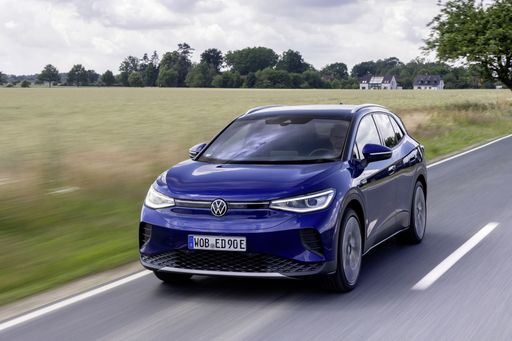
VW ID.4
VW ID.4 Video
VW ID.4
The VW ID.4 represents Volkswagen's commitment to the electric vehicle market, combining contemporary design with sustainability. Its spacious interior and intuitive technology make it an attractive choice for those seeking comfort and innovation in an eco-friendly package. With a focus on electric performance and practicality, this car is set to be a popular option among environmentally-conscious drivers.
details @ Volkswagen
@ Volkswagen
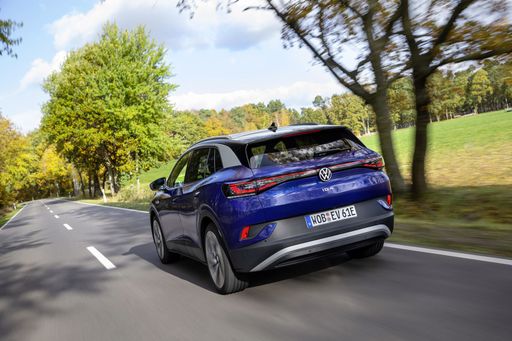 @ Volkswagen
@ Volkswagen
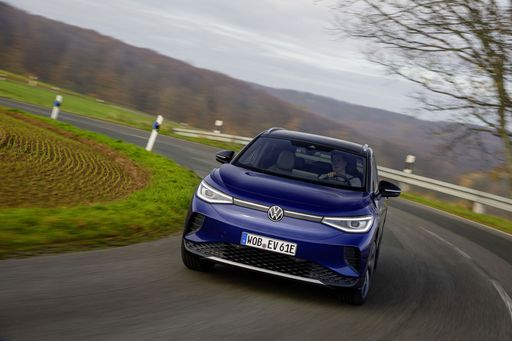 @ Volkswagen
@ Volkswagen
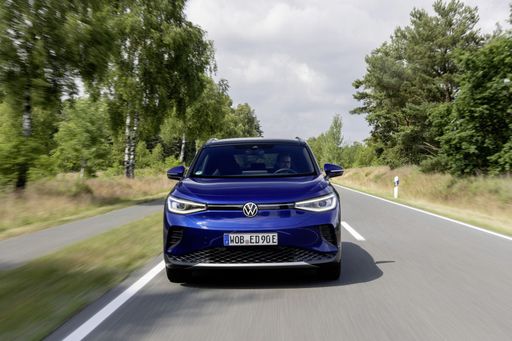 @ Volkswagen
@ Volkswagen
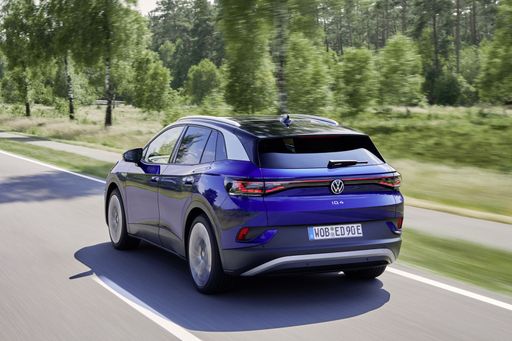 @ Volkswagen
@ Volkswagen
 @ Volkswagen
@ Volkswagen
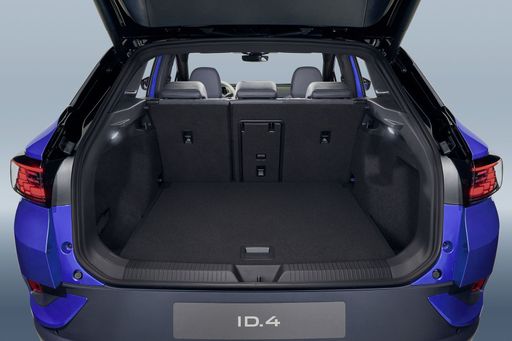 @ Volkswagen
@ Volkswagen
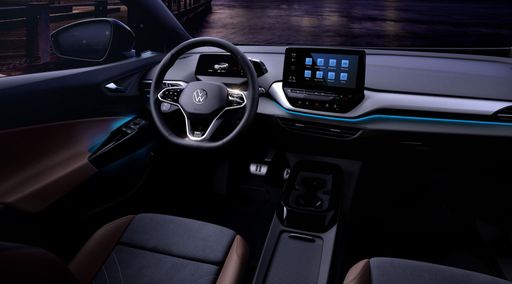 @ Volkswagen
@ Volkswagen
DS Automobiles N°4
The DS Automobiles N°4 showcases French elegance and innovation at its finest, blending luxury and cutting-edge technology seamlessly. This model is distinguished by its sophisticated design and attention to detail, offering a driving experience that resonates with both performance enthusiasts and lovers of style. As a hallmark of DS Automobiles' commitment to excellence, the N°4 continues to redefine what it means to drive a luxury vehicle, providing comfort and dynamic performance in equal measure.
details

|
|
|
|
|
Costs and Consumption |
|
|---|---|
|
Price
34600 - 47200 £
|
Price
33100 - 47100 £
|
|
Consumption L/100km
-
|
Consumption L/100km
3 - 5.2 L
|
|
Consumption kWh/100km
15.6 - 17 kWh
|
Consumption kWh/100km
15 kWh
|
|
Electric Range
356 - 569 km
|
Electric Range
77 - 449 km
|
|
Battery Capacity
52 - 77 kWh
|
Battery Capacity
14.6 - 58.3 kWh
|
|
co2
0 g/km
|
co2
0 - 116 g/km
|
|
Fuel tank capacity
-
|
Fuel tank capacity
40 - 52 L
|
Dimensions and Body |
|
|---|---|
|
Body Type
SUV
|
Body Type
Hatchback
|
|
Seats
5
|
Seats
5
|
|
Doors
5
|
Doors
5
|
|
Curb weight
1975 - 2248 kg
|
Curb weight
1463 - 1792 kg
|
|
Trunk capacity
543 L
|
Trunk capacity
360 - 430 L
|
|
Length
4582 - 4584 mm
|
Length
4400 mm
|
|
Width
1852 mm
|
Width
1830 mm
|
|
Height
1619 - 1634 mm
|
Height
1470 mm
|
|
Max trunk capacity
1575 L
|
Max trunk capacity
1190 - 1240 L
|
|
Payload
511 - 551 kg
|
Payload
458 - 542 kg
|
Engine and Performance |
|
|---|---|
|
Engine Type
Electric
|
Engine Type
Petrol MHEV, Plugin Hybrid, Electric
|
|
Transmission
Automatic
|
Transmission
Automatic
|
|
Transmission Detail
Reduction Gearbox
|
Transmission Detail
Dual-Clutch Automatic, Reduction Gearbox
|
|
Drive Type
Rear-Wheel Drive, All-Wheel Drive
|
Drive Type
Front-Wheel Drive
|
|
Power HP
170 - 340 HP
|
Power HP
136 - 224 HP
|
|
Acceleration 0-100km/h
5.4 - 9 s
|
Acceleration 0-100km/h
7.1 - 9.5 s
|
|
Max Speed
160 - 180 km/h
|
Max Speed
160 - 233 km/h
|
|
Torque
310 - 679 Nm
|
Torque
230 - 360 Nm
|
|
Number of Cylinders
-
|
Number of Cylinders
3 - 4
|
|
Power kW
125 - 250 kW
|
Power kW
107 - 165 kW
|
|
Engine capacity
-
|
Engine capacity
1199 - 1598 cm3
|
General |
|
|---|---|
|
Model Year
2023 - 2025
|
Model Year
2025
|
|
CO2 Efficiency Class
A
|
CO2 Efficiency Class
D, B, A
|
|
Brand
VW
|
Brand
DS Automobiles
|
Is the VW ID.4 offered with different drivetrains?
Available configurations include Rear-Wheel Drive or All-Wheel Drive.
The prices and data displayed are estimates based on German list prices and may vary by country. This information is not legally binding.
